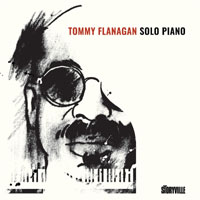Tommy Flanagan • Solo Piano
Solo Piano, part of which was released in 2005 but withdrawn shortly thereafter, due to a programming error, stems from studio sessions captured on tape in late February 1974, in Zurich, Switzerland. Until this recording, the only albums feeding the Flanagan-as-leader revival were Pablo’s 1975 The Tokyo Recital and Denon’s 1977 Alone Too Long. Why it took 47 years for this session to surface in full is a mystery to me, although I’m mighty glad it finally did. Flanagan, a bopper in the true sense of the word, also incorporated his strong sense of swing into his music, making his recordings not only enlighteningly challenging but enjoyably melodic and rhythmic as well. Unlike with many strictly bop recordings, you could actually dance along to many of the tunes on this recording, and, unlike many performers, Flanagan didn’t rely on flamboyance to grab your attention. His carefully chosen notes do that. Leading off this recital is a 1951 Bud Powell staple, “Parisian Thoroughfare.” Flanagan treats your ears to an intimate reading of this jazz standard without straying far from the lead line. The piano sounds closely miked, to the point that you might feel trapped inside it. And yet, to my ears, it sounds just fine. Another Powell classic, “Wail,” follows, with the pianist ripping through the song like a freight train on the mainline. The piano has taken on a softer sound on this and the remainder of the tracks. Showcasing his lyrical style, which was as good as anyone’s, Flanagan turns to the Rodgers & Hart classic, “Isn’t It Romantic.” His bop heritage is checked at the gate here with a delicious reading of this iconic tune, as it is on the next song, “A Sleeping Bee.” Born out of the unlikely association between Harold Arlen and Truman Capote, “A Sleeping Bee” appeared in the 1950s stage play House of Flowers. It has been called “one of the greatest ballads” of the late twentieth century by authors Jenness and Velsey. Listening to Flanagan’s delicate version lends credibility to that statement. The mood changes to exuberant on Jerome Kern’s evergreen “Yesterdays.” After a perfectly executed intro, Flanagan shows off his chops by charging through the changes with a spirit that would give fleet-fingered Oscar Peterson a run for the money. This is followed up with a rather direct interpretation of the 1933 swing standard “Stompin’ at the Savoy.” Duke Ellington collaborator Billy Strayhorn is honored with a medley of his works, including “Passion Flower,” “Chelsea Bridge,” “Pretty Girl,” and the rarely performed “U.M.M.G.” (Upper Manhattan Medical Group). The piano sound on these four tunes is exceptional. Every nuance in the process of making music, including the action of felt hammers on tautly drawn steel strings, is captured beautifully by the close miking. Flanagan offers rather straightforward versions of each of the four songs that rarely stray from the melody -- embellishments, yes; departures, no. His interpretation of “Pretty Girl” is pretty, and despite the occasional splayed note in “U.M.M.G.,” he maintains a flirtatious stride style while demonstrating his mastery of the keyboard. A change in piano sound, less organic and more removed, introduces Dizzy Gillespie’s “Con Alma,” which receives a brief, spirited take. Next, the iconic standard, “If You Could See Me Now” receives a tasteful, flowing interpretation and demonstrates again Flanagan’s singular lyricism. Those used to Monk’s jangly performance of his mid-1940s composition “Ruby My Dear” will be either pleasantly surprised or angry at Flanagan’s finessed and melody-driven interpretation. Finally, Richard Rogers’ “Lover” brings the set to an end with a spirited, neo-boppish take, Flanagan’s dexterity heard clearly in the lovely, articulated phrases. The song ends all too soon and, surprisingly, rather abruptly. Flanagan’s death in November of 2001 at the too
young age of 71 left a void in the roster of jazz piano stylists that has yet to be
refilled. I cannot imagine anyone, jazz fan or not, coming away from a listen to this CD
with anything but a smile on his or her face. Complementing the performances, the fine --
and often outstanding -- sound should please any audiophile. |

 ommy
Flanagan’s career spanned 45 years, during which he served as Ella Fitzgerald’s
accompanist and musical director for over a decade, starting in 1962. In addition to
appearances on Sonny Rollins' Saxophone Colossus (1956), John Coltrane’s Giant
Steps (1959), Wes Montgomery’s Incredible Jazz Guitar of . . . (1960)
and Art Pepper’s Straight Life (1979), he was nominated for four Best Jazz
Performance Grammy Awards. His own discography includes over 30 albums as a leader and
over 200 as a sideman. He was a master of modesty, his music incorporating the essential
qualities associated with jazz -- harmonic innovation, melodic imagination, humor,
interest in the blues and, most importantly, swing. His 1958 Prestige album Overseas
incorporated all of the above. I consider it a prototypical jazz piano-trio album.
ommy
Flanagan’s career spanned 45 years, during which he served as Ella Fitzgerald’s
accompanist and musical director for over a decade, starting in 1962. In addition to
appearances on Sonny Rollins' Saxophone Colossus (1956), John Coltrane’s Giant
Steps (1959), Wes Montgomery’s Incredible Jazz Guitar of . . . (1960)
and Art Pepper’s Straight Life (1979), he was nominated for four Best Jazz
Performance Grammy Awards. His own discography includes over 30 albums as a leader and
over 200 as a sideman. He was a master of modesty, his music incorporating the essential
qualities associated with jazz -- harmonic innovation, melodic imagination, humor,
interest in the blues and, most importantly, swing. His 1958 Prestige album Overseas
incorporated all of the above. I consider it a prototypical jazz piano-trio album.